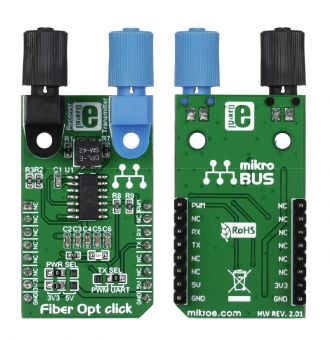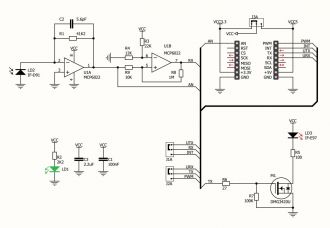
We strongly encourage users to use Package manager for sharing their code on Libstock website, because it boosts your efficiency and leaves the end user with no room for error. [more info]

Rating:
Author: MIKROE
Last Updated: 2019-07-30
Package Version: 1.0.0.1
mikroSDK Library: 1.0.0.0
Category: Fiber optics
Downloaded: 6861 times
Followed by: 1 user
License: MIT license
This is demonstration project how Fiber Opto click can be used in communication applications.
Example can be tested on single development system with loop connection(Rx1-Tx1) or in pair with other development system + Fiber Opt click (Rx1-Tx2; Rx2-Tx1).
Do you want to subscribe in order to receive notifications regarding "Fiber Opt click " changes.
Do you want to unsubscribe in order to stop receiving notifications regarding "Fiber Opt click " changes.
Do you want to report abuse regarding "Fiber Opt click ".

Library Description
Defines and initializes driver's UART bus. Declares and defines driver's functions for sending and receiving data bytes, also for checking if data byte ready for reading.
Key functions:
void fiberopt_writeByte(uint8_t input) - Writes sinle byte.uint8_t fiberopt_readByte() - Read received byte.uint8_t fiberopt_byteReady() - Checks is there a new byte received.Examples description
The application is composed of three sections :
void applicationTask()
{
char tmp;
uint8_t rdyFlag;
// RECEIVER - UART polling
rdyFlag = fiberopt_byteReady();
if (1 == rdyFlag)
{
tmp = fiberopt_readByte();
mikrobus_logWrite( &tmp, _LOG_BYTE );
}
// TRANSMITER - TX each 2 sec
/*
for (tmp = 0; tmp < 9; tmp++)
{
fiberopt_writeByte( MESSAGE_DATA[tmp] );
mikrobus_logWrite( "MESSAGE SENT", _LOG_LINE );
}
Delay_ms(2000);
*/
}
Other mikroE Libraries used in the example:
Additional notes and informations
Depending on the development board you are using, you may need USB UART click, USB UART 2 click or RS232 click to connect to your PC, for development systems with no UART to USB interface available on the board. The terminal available in all MikroElektronika compilers, or any other terminal application of your choice, can be used to read the message.
